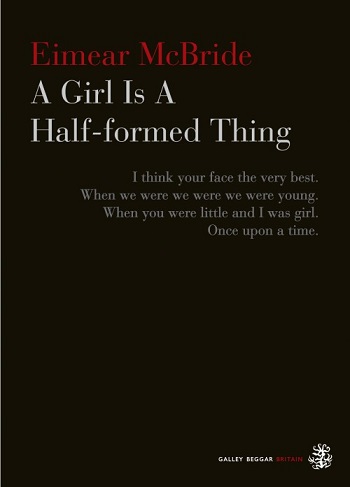A Girl is a Half-Formed Thing is Eimear McBride’s Goldsmith’s Prize-winning debut novel. It is a strange thing. It has all the intensity and ferocity of a debut, with none of the naivety. A first novel is usually a battle cry — a sign of things to come. I have no idea what A Girl signals for McBride’s career. This isn’t a criticism; the book is stunning. But it is so singular, so claustrophobic, so utterly without any possible escape, that it seems absurd that it could bear any relation to or reveal any information about a possible future work. Producing a work like A Girl is a Half-Formed Thing certainly requires a well-honed craft. But it is a craft that seems almost entirely unrelated to that of novel writing. Statements like, ‘A powerful and unique new voice’ — while undoubtedly true — seem unbearably trite. The book, I should repeat, is stunning.
A young boy is diagnosed with a brain tumour. The doctors tell his parents that he will die. ‘He’s running out I’m afraid. I’m afraid he’s running down. You should take him home, enjoy him while you can.’ His father leaves. Then—surprisingly, miraculously — the boy survives to see his sister, the book’s narrator, born. The rest of the book details their upbringing —i.e. the period of the disease’s protracted remission — and its eventual, fatal return in young adulthood. Throughout, the eponymous girl struggles to define herself against the backdrop of a hostile world in which her subjectivity is stifled and thwarted from every angle — by an overzealous mother, a sick brother, the airless confines of a Catholic upbringing, a pathological sexuality and by an abusive family member.
The book is steeped in guilt. In some sense, human relations in the novel just are exchanges of guilt. Everything that should support fails to; be that family, friends or religion. Everything that should support becomes a means of giving and receiving the burden of guilt. And tragically, the only way the narrator can alleviate it is to invite more guilt. While water is usually a symbol of purification — one goes to water to expunge oneself of guilt; to clean oneself — here, the lake near the narrator’s childhood home is the scene of repeated sexual encounters; some consensual, others not. Time and time again she returns to the lake. It forms the scene of her attempts to atone her guilt, not through the sacrament of baptism, but through debasement. The self-destructive cycle has been well-documented in literature. But rarely does it feel so heart-wrenchingly un-self-indulgent. By successfully forcing you into her head, by swarming you in the fog of war, McBride makes the narrator’s awful decisions seem not only understandable from a diagnostic perspective, but, far more disturbingly, in some sense necessary. This makes reading the book so much more difficult. Because to read the book isn’t to watch a rat running around a tunnel, eating the poison that will kill it. It is to be that rat. It isn’t frustrating, it’s painful.
What’s most disturbing is that the eponymous girl is half-formed, not un-formed. While she is not fully in control of her destiny, she is not a passive receptacle for abuse, either. She is an active participant in her fate. She is abused repeatedly by various sexual partners throughout her adolescence and young adulthood. And yet there is an uncomfortable sense in which she uses her sexual partners, too. Of course nothing she does constitutes a crime, or comes remotely close to what she suffers. But this level of engagement makes the book so much more complex, realistic and difficult to read than a simple abuser-victim narrative. Her complicity in her fate elevates it to the level of tragedy.
The blossoming flower or growing tree is a stock metaphor for growth and development. But here, in a book about thwarted subjectivities, the metaphor is perverted. It becomes that which works against human development, that which overcomes and undoes the flailing subject.
Listen in to doctor chat. We done the best we could. There really wasn’t much. It’s all through his brain like the roots of trees.
McBride resists any form of sensationalism. The brain tumour that kills the narrator’s brother is not the result of some malign intention, but stems from the altogether more terrifying anonymity of a blind force. It is the most natural thing. But much later, when her brother is dying, the narrator says:
I dream of … burrows rabbits safe from rain. Roots growing caverns round our heads.
Thus the metaphor of the growing plant as a productive, protective force is restored. Roots ground us; they keep us safe. They allow us to grow. But what happens when those roots keep growing, get out of hand? When the perfectly natural forces of life are too strong? She continues:
But I dream. Roots come growing. Slowly and tangle in. And roots come more. And fat and thick. And roots come fast. Roots fast in. Roots seek us. Catch us. Roots that want our head. Our eyes. We move about. The trees will have us. Have our brains for. No one in. That the trees will have us. Roots growing in the bursting through our skulls. Through in through our brains.
The greatest tragedy is perfectly natural. It is, perhaps, not even a privation of life, but an excess. The world into which we are born is one that, by its normal workings, presents unspeakable risks and sufferings. It is a world in which we are only provisionally at home, a world which is from the first ready to eject us without any contradiction; this is the book’s unsettling truth.
Towards the end of the book, the narrator says: ‘And you start. To cry. Like my little boy I knew. I knew. When I was younger than you. So many years ago when.’ Development isn’t only stifled, it’s reversed. The brother eventually reverts to a state of childhood. This culminates in a harrowing scene in which he has to be dressed in nappies.
I’ve to. You can do what you have to there. Shut what a thing to say. Give me a hand. Up. I. Listen you’re alright there. You say. What? Your face red. … I hear you. Crying. Going in the nappy. Rage. Not fair. Not fair. You wait til I’m well. You can definitely kill me then I say.
While an inattentive reading of the book might cast it as a bildungsroman, set against the backdrop of familial tragedy, really it’s the opposite; a kind of anti-bildungsroman, in which the characters aren’t allowed to grow. In which they stagnate, or revert. What grows and blossoms is, instead, everything that works against them.
Bodies, in the novel, revolt—in both senses of the word. Their bizarre workings and secretions are documented in uncomfortable detail. From the banal embarrassments of adolescence to the inevitability of death—the latter somehow reflected in the former—McBride’s descriptions are able to get right under one’s skin, to show just how badly it fits.
Pack up. Teeth feeling itchy in my head. I’ve eczema, a load of spots, then a bleeding, Jesus, period one day.
The body is portrayed as something one drags around; something with which one is encumbered and which exposes one to the threats of embarrassment, pain, violence, penetration, death. To have a body is to exist precariously, to be defined by forces beyond one’s control, to be always dying and perhaps much sooner than one imagined. To have a body is to be able to suffer.
Unsurprisingly, one of the most widely discussed aspects of it book is its style. With its broken sentences, poetic repetition and neologisms, it is reminiscent of late Beckett, or Joyce. At a reading McBride told the audience that while she was inspired by Joyce’s Finnegan’s Wake, she saw her book as a step back from that work. By retrieving the human McBride goes both further and less far than the high modernism of the Twentieth Century. Which is, perhaps, the only way of going further. McBride’s language is scarred and broken, its signifiers are cut loose. And yet, like Beckettian heroes, they hobble on, failing better to capture the trauma they evoke. Comparisons with Beckett and Joyce are inevitable, but I think, most of all, of Paul Celan. Both write at the edge of meaning, over the ever-shifting precipice of nonsense that threatens their words from all angles. And yet, from a matrix of unimaginable sufferings, both wrench the most beautiful, dark, terse and troubling poetry.
Reading A Girl is a Half-Formed Thing isn’t a pleasant experience. It is difficult in subject matter, and in style. But all too often the modern novel presents us with a superficial grimness that can far too easily and comfortably be accommodated into the realm of enjoyment. Over and over we read about some affectless quasi-sociopathic antihero who lives in a world of shit, without any possibility of redemption. And yet we never feel that we are challenged, or made genuinely uncomfortable, or that anything is really at stake. On the other hand, there is the dross that fills that newest and most pernicious of bookshop categories, Tragic Lives. McBride’s is one of those rare novels that walks the tightrope between the vices of trite nihilism and naive sentimentality. It is a book entirely without shortcuts. To read it is to be challenged, to be made genuinely uncomfortable, and yet to come out the other side feeling enriched. A Girl restores the risk that has and should define literature. The Goldsmith’s Prize was established to reward novelty and risk-taking in the novel. To that extent, McBride’s win wasn’t only justified, it was necessary.

A Girl is a Half-Formed Thing is out now, published by Galley Beggar Press



